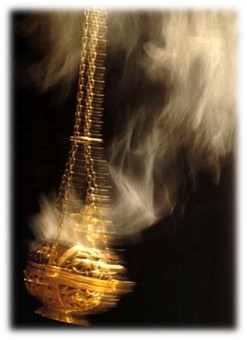
To honour God.
So, also let your prayers rise up to God.
Why all this smoke in the church? Why during Mass or other devotions do we sometimes burn incense in the censer (thurible)?
There is no unequivocal answer to this question because we incense both objects and people. And in different ways. We read in the General Instruction of the Roman Missal: “Three swings of the thurible are used to incense: the Most Blessed Sacrament, a relic of the Holy Cross and images of the Lord exposed for public veneration, the offerings for the Sacrifice of the Mass, the altar cross, the Book of the Gospels, the paschal candle, the Priest, and the people”. We read further on – “Two swings of the thurible are used to incense relics and images of the Saints exposed for public veneration; this should be done, however, only at the beginning of the celebration, following the incensation of the altar”. And “The altar is incensed with single swings of the thurible”. Okay, but why?
From the earliest ages, incense . . . . was used to cover the stench. Coming from – as you can imagine – various sources. The intense odour of incense makes the smell hardly noticeable or at least less bothersome. Therefore, it was used – and still is – in situations which have nothing to do with worship. And since it is a sort of extravagance – just like perfume – its use could even be an indication of social status.
Was incense used in many cults of worship to emphasise the importance of certain sacred things? It is hard to say. It is known it was used by many pagan cults. Incense was also burnt before the one, true God the Temple of Jerusalem (source of tradition Exodus 30:7). It is hard not to notice, however, that it had a very practical use. After all, we know that both in many pagan cults and in the religion of Israel, sacrificial offerings were made by burning what was brought for sacrifice. We can assume that the smells emanating from the burning sacrifice was not pleasant to the senses. However, why is incense used by Christians, who don’t offer to God such sacrifices?
It’s a fact that Christians didn’t use incense for a long time in their worship. It was probably too strongly associated with offering sacrifices to the pagan gods, which they were being forced to do. It then appeared in the 4th century when persecutions ceased – at least the territories of the Roman Empire. Today, incensing is an expression of respect. For people if they are incensed or for objects incensed. In the end, God Himself is venerated when we incense the Blessed Sacrament. Is this enough?
“Let my prayer be counted as incense before thee” – we can read in Psalm 141, and in other translations of this psalm we find the wish that this prayer rises up to God like incense: “Regard my prayer as my evening sacrifice and as incense wafting up to you” (The Living Bible). Is prayer to be like incense? Is it to rise like incense? Or what?
When you see the clouds of smoke disgorging from the censer, it’s easy to see that it goes in different directions. It depends on the circulation of air (the mischievous might say: drafts). It moves to the sides, upwards and flows down, sometimes quickly, sometimes slowly. Most often it’s not easy to tell beforehand what will happen. However, sooner or later, the scent always, even if the smoke is no longer visible, reaches the furthest corners of the church. And so – the psalmist asks, as we do – it is to be with our prayers. We don’t need to know how or which way, we don’t have to know about any patterns, but let it reach God. And let this prayer like the fragrance of incense be pleasant to Him.
So, whenever incense is used in the church it’s worth remembering that it is to show reverence to God, and to show respect to us gathered before Him; may only what is beautiful reach us, and no stench. At times when we want hear God’s response to our cries and He seems to be silent, this smoke and fragrance can provide comforting hope: that our prayers, like the fragrance of incense, will reach Him even may seem they melt away somewhere into nothingness. However, we also need to be aware that the burning of incense alone is not an alternative for sincere faith. Isaiah wrote (66:3):
But whoever sacrifices a bull
is like one who kills a person,
and whoever offers a lamb
is like one who breaks a dog’s neck;
whoever makes a grain offering
is like one who presents pig’s blood,
and whoever burns memorial incense
is like one who worships an idol.
Real faith is as far away from formalised empty gestures as possible. Moreover, they can become almost magical practices, but be our sincere praise flowing together with the smoke and pleasant fragrance to God.